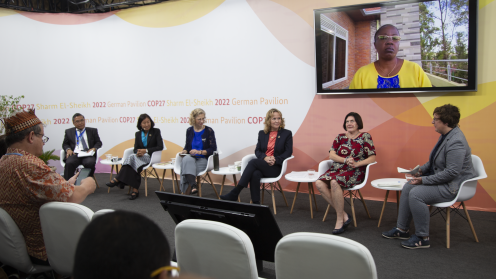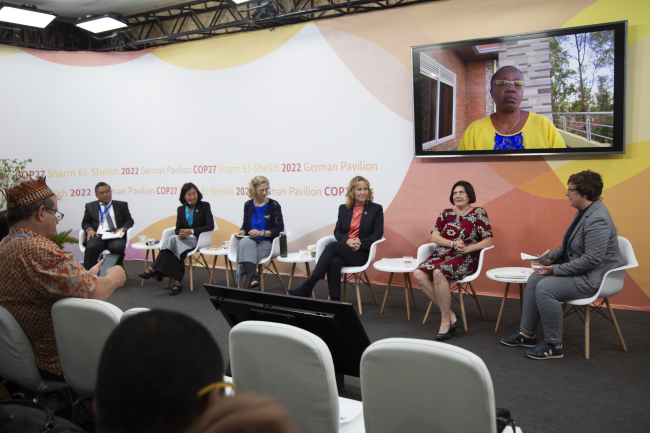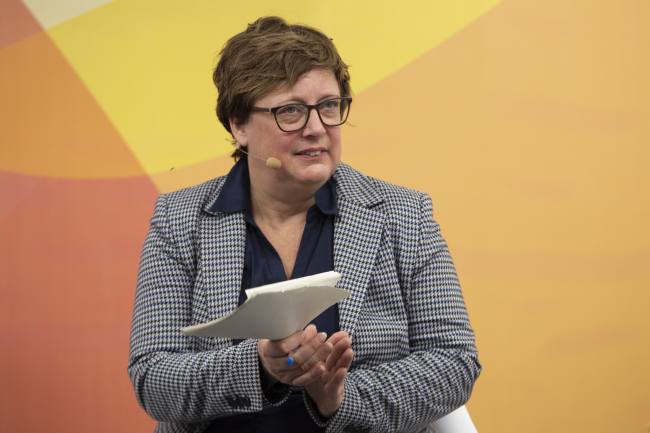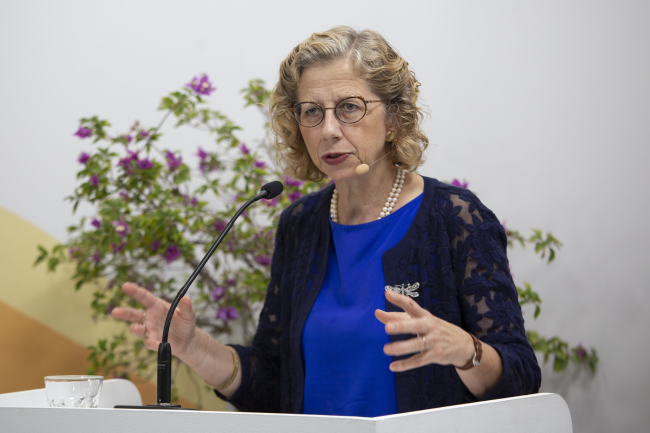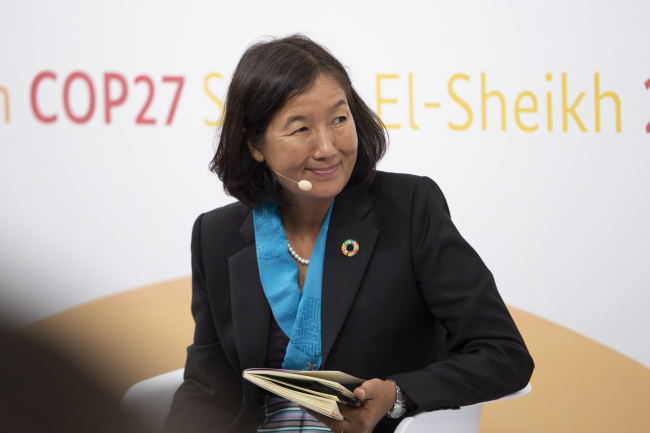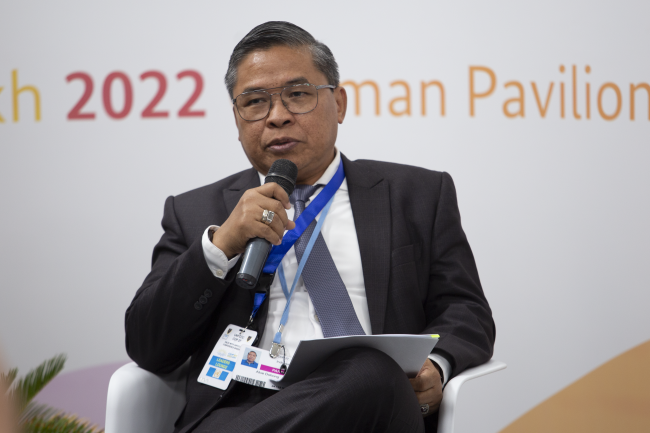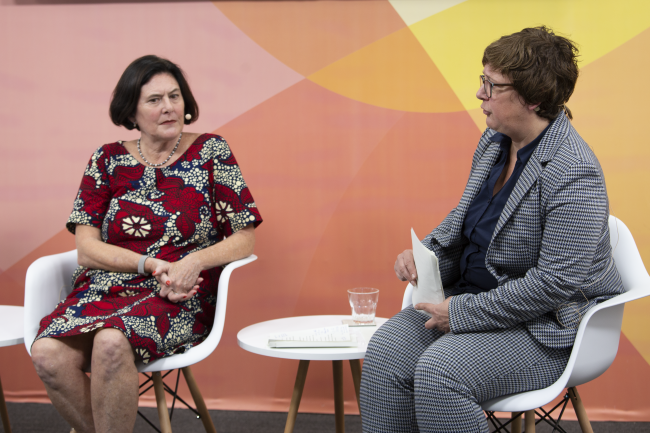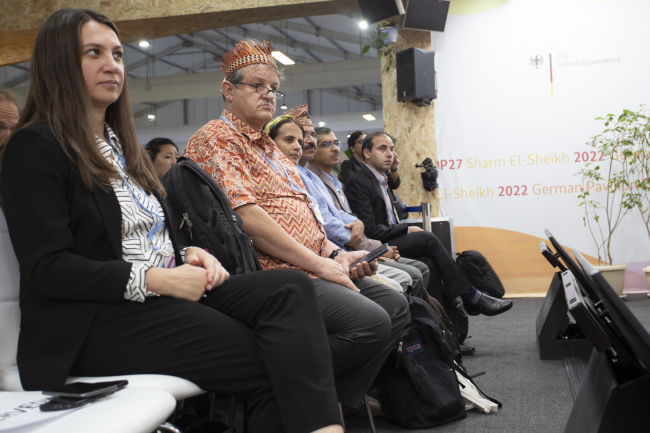About
This side event showcased the potential for stepping up implementation of NbS across multiple policy sectors and saw the launch of a new UN Environmental Programme (UNEP) report, and a new initiative to coordinate global efforts to advance NbS.
Nature-based solutions (NbS) are crucial elements of effective and just action to address climate change, but financing and ambition to harness the power of the natural world are falling far short of what is required if we are to avoid the worst consequences of a warming world. Seeking to build on momentum stemming from pledges during COP 26, this event showcased the potential for stepping up implementation of NbS across multiple policy sectors and saw the launch of a new UN Environmental Programme (UNEP) report, Nature-based Solutions: Opportunities and Challenges for Scaling Up, and a new initiative to coordinate global efforts to advance NbS,
Moderator Inka Gnittke, BMUV, Germany, introduced the event by highlighting the new Enhancing Nature-based Solutions for an Accelerated Climate Transformation (ENACT) initiative to coordinate action on biodiversity and NbS, which was launched by Germany, the Egyptian COP 27 Presidency, and International Union for Conservation of Nature (IUCN).
Opening the panel, Steffi Lemke, Federal Minister, BMUV, emphasized that NbS are capable of addressing the interconnected crises of climate change, biodiversity loss, and pollution. Lemke highlighted Germany’s pledge to increase financing for international action on biodiversity by EUR 1.5 billion and urged reflecting NbS in Nationally Determined Contributions (NDCs) and in the closing declaration of COP 27.
Jeanne d’Arc Mujawamariya, Minister of Environment, Rwanda, highlighted her country’s work to restore wetlands, which are vital carbon sinks that enhance climate adaptation. Mujawamariya stressed that investments in NbS pay off many times over and have multiple co-benefits, including cleaner air and “economic growth that leaves no one behind.”
Giovanna Valverde, Permanent Representative of Costa Rica to UNEP and UN-HABITAT, described Costa Rica’s experience in halting rapid deforestation and restoring ecosystems, which has been achieved with the involvement of Indigenous Peoples and local communities. Valverde emphasized that adaptation benefits have stemmed from mitigation efforts, as climate resilience has been enhanced by moving away from unsustainable livestock and agricultural practices. Valverde noted Costa Rica is now embarking on an urban environmental agenda to improve climate resilience in the country’s densely populated cities.
Inger Andersen, Executive Director, UNEP, highlighted the history that led to the present momentum on NbS, including partially successful efforts to slow deforestation and IUCN’s work to define NbS in 2016. Anderson stressed that Germany’s financial pledge will be crucial for achieving the milestone of 1 gigaton of emissions reductions by 2025. She stressed the need for concrete actions on the ground, as well as equity and fairness in finance “so we can address this head on for people and for the planet.”
Pasang Dolma Sherpa, CIPRED, emphasized the need to exchange knowledge, including of Indigenous Peoples who make a globally outsized contribution to fostering NbS. Sherpa stressed the need to recognize and protect traditional knowledge and values that are based on NbS, which requires scaling up financial support.
Alue Dohong, Deputy Minister of Environment and Forestry, Indonesia, highlighted the implementation of NbS through the preservation of peatland and mangrove forests in his country. Peatlands have a vast capacity to act as carbon sinks, but in the dry season they are at the risk of fires that can unleash thick plumes of smoke for months, he added. He said Indonesia has implemented a large-scale peatland and mangrove restoration project that involves actions to maintain a high water table to keep the peatlands wet throughout the dry season. However, he noted the present focus on carbon sequestration projects, such as planting trees, overlooks the need to protect the carbon sinks that already exist. Dohong underscored new enforcement mechanisms and sustainable forest management practices in Indonesia that are helping stem deforestation and preserve ecosystems.
In her closing remarks, Lemke urged more partners to join the ENACT initiative and highlighted three key takeaways from the event:
- the importance of ensuring NbS have a cross-sectoral design and funding;
- the need to share experiences and improve cooperation between different sectors in order to scale up NbS implementation at the national and international level;
- the success of sustainable implementation of NbS at the local level requires the involvement of all relevant stakeholders, especially local and Indigenous communities.
“Let us build on today’s event and work together to advance NbS,” Lemke concluded.
Organizers: BMUV and UNEP
Contact: Patrick Lutz I Patrick.Lutz@z-u-g.org
For more information: https://www.bmuv.de/
